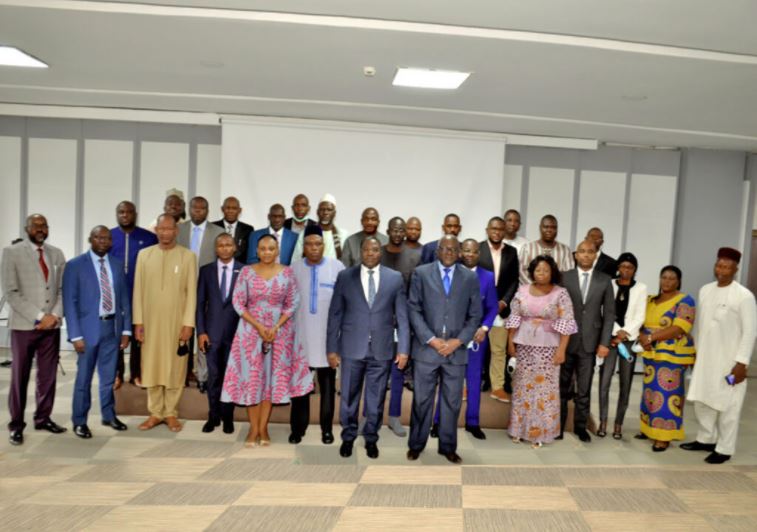
Working session in Ghana, on the dematerialization of the ECOWAS certificate of origin
 on July 18, 2019, a delegation of the ECOWAS Commission went to Accra to have a working session with the services in charge of the question of the certification of products of Community origin and more specifically the question of the dematerialization of the certificate of Community origin.
on July 18, 2019, a delegation of the ECOWAS Commission went to Accra to have a working session with the services in charge of the question of the certification of products of Community origin and more specifically the question of the dematerialization of the certificate of Community origin.
The working session began with the presentation of the technical specifications for the dematerialization of its system of attribution of the certificates of origin and more specifically the certificate of Community origin. Then followed the presentation of the functional specifications with an online filling of the information required to apply for a certificate of origin.
The presentation of the technical specifications showed the methods, processes, and technologies selected to cope with the constraints of project realization and also the importance of certain information to provide to have a dematerialized Certificate of origin which fully takes the format defined by the ECOWAS Commission.
The presentation of functional specifications was made in ‘direct’ to allow the working group to follow the various stages of filling the certificate of origin and the time taken to provide the information necessary for its establishment and validation. Below are the steps to obtain a certificate of community origin;
- The Certificate of Community Origin is established by the National Chamber of Commerce and Industry of Ghana. A platform called eMDA (Electronic Ministries Department and Agencies Platform) is used to allow the application and issuance of the Certificate of Community Origin .
- The eMDA is connected to the GCNet and (Ghana Revenue Authority) system. On this platform all requests for certificate of origin are possible. First the exporter who wishes to apply for a certificate of origin must register on the platform by providing all the information about his company. After completing this registration form on the platform, a registration number is assigned called Unique Consignee Reference (UCR). This number will be used by the exporter to apply for a certificate of origin online. It is valid for 2 years.
- The second step is the request itself. The exporter must provide all the necessary information about his company, the Community products, the means of transport, the route of the sending (exit point). This information provided is in accordance with the information required according to the format of the certificate of origin of ECOWAS. After having validated this information, on the platform, the exporter sends the electronically signed request to the National Chamber of Commerce and Industry, which must verify them before validation. The validation is done by electronic signature of the Chamber of Commerce and sent electronically to the Ghana GCNet customs system. Ghana Customs verifies the information provided on the basis of the attached files and validates or not the certificate of origin.
When the certificate of origin is validated by the customs the electronic signature is affixed to it and the document is printed according to the format of ECOWAS (ref to the legal framework of the certificate of origin). On this certificate of origin exists a bar code which makes it possible to read all the information given online previously.
In addition, the ECOWAS Commission expressed its interest in the electronic transmission of the certificate of origin instead of the printed version to the State of import. However, this is only possible if the country of origin has access to the customs system of the receiving country, which is not currently the case. The ECOWAS Commission has asked the Ghana Chamber of Commerce and Industry to submit a proposal for a system for transmitting the electronic certificate of origin to the country of receipt. This proposal will be sent to the Directorate of the Customs Union and Taxation who will work with the Direction of the Community Computer Center to see if this proposal is in conformity with the procedures of the ECOWAS Commission.



